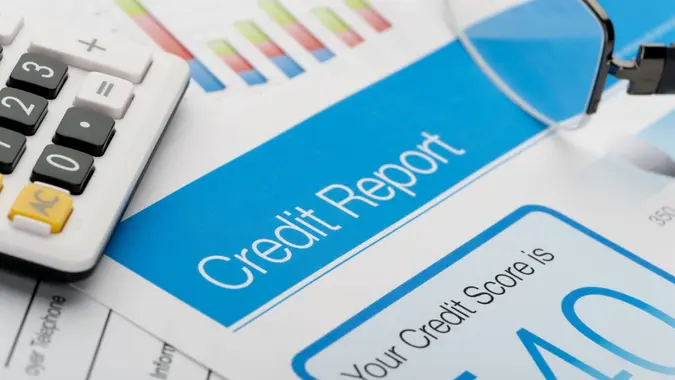The Credit Score You Should Aim for To Get the Best Rates

Commitment to Our Readers
GOBankingRates' editorial team is committed to bringing you unbiased reviews and information. We use data-driven methodologies to evaluate financial products and services - our reviews and ratings are not influenced by advertisers. You can read more about our editorial guidelines and our products and services review methodology.

20 Years
Helping You Live Richer

Reviewed
by Experts

Trusted by
Millions of Readers
If you can’t hit a perfect credit score, what should you really aim for to get good rates? Experts say to aim for a credit rating in the mid-700s.
Credit checks are common during the application process for a loan or credit card. Your credit score is a way for lenders to assess your creditworthiness. A higher score typically indicates that you have a long history of timely payments and low credit balances, while a lower score may tell lenders that you’re an unreliable borrower. Even if the lender is still willing to offer you a loan with a lower credit score, such as an auto loan or mortgage, it usually comes with higher interest rates.
FICO Scores is the most widely used credit scoring system, with scores ranging between 300 and 800. The higher the score, the lower your perceived risk to lenders. Here are the credit score ranges and their ratings, according to FICO:
- Poor: 300-579
- Fair: 580-669
- Good: 670-739
- Very good: 740-799
- Exceptional: 800-850
The average U.S. credit score is 717, according to FICO. This may not get you the best offers, but you don’t necessarily need a perfect score, either. Credit expert John Ulzheimer told CNBC Select that a 760 will get you the best mortgage rate, while a 720 will get you the best interest rate on an auto loan.
“I always tell people, shoot for 760 or better,” Ulzheimer said. “That way, they’re safe for all loan types and cards.”
And FICO agrees. “From the standpoint of qualifying for credit, it doesn’t matter whether you have a perfect 850 or a score just below that,” said Ethan Dornhelm, VP of FICO Scores and predictive analytics, CNBC Select reported. “To lenders, a consumer with a score in the 800s is a sparkling applicant.”
In terms of mortgage rates, borrowers in the 700 to 759 range can expect to pay 0.2 percentage points more (20 basis points) than a borrower with a perfect credit score on a 30-year fixed-rate loan, Refi reported. From there, interest rates increase for every 20-point decrease in their credit score. When your rate goes below 660, there’s a 0.43 percentage point increase for borrowers with scores in the 640-659 range. Below that, you can add another half percent.
 Written by
Written by  Edited by
Edited by 
























